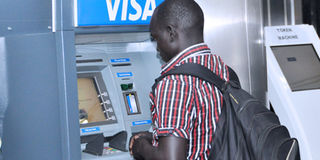Keep track of your bank transactions

A man withdraws money from an Automated Teller Machine. Different banks have monthly money charges on accounts. PHOTO | FILE
Ms Zaharah Nambooze, a third year student at Makerere University, recalls the fateful Friday evening when she received a text message notifying her that she had withdrawn Shs100,000 from her bank account during the Covid-19 pandemic lockdown.
“I had not transacted any amount of money from my bank account,”Nambooze narrates.
Ms Nambooze immediately called the bank customer care service notifying them about what had happened to her account.
“It took me a period of time to explain my predicament to the bank authorities. I was told I had engaged in an online shopping, something I had not done in the past five months,” she says.
The customer care officer asked her to send an email to the bank notifying them of what had happened to her account.
The bank later informed her that fraudsters had hacked into her account. After two weeks, Ms Nambooze recovered Shs70,000 instead of the Shs100,000.
Similar incidences had also happened to Ms Ritah Namale, whose bank account balance showed negatives when she wanted to withdraw money.
“I had never withdrawn my savings. I thought it was safe to keep whatever little amount of money I got in the bank,” she recalls.
“Never at one point did I withdraw any savings from my account,” says Ms Namale who was caught off guard when she wanted to buy a laptop using these savings. To her dismay, there were no savings!
Ms Namale later met the bank manager to understand what went wrong with her account.
“When I asked the bank manager, she said there are monthly charges on each bank account which caused my account to have negative balances since I had stopped depositing money onto her bank account,” she recollects.
As the country slowly adjusts to the ‘new normal’ amidst Covid-19 pandemic, a number of businesses are in rebound of different economic activities.
As we think of how to make more deposits into the bank, it is important to keep track of transactions. This is better when you receive notifications on either the mobile phone or via email.
Ms Namale is currently dealing in events management but she is worried that what happened to her will re-occur.
This is because although the president recently eased the Covid-19 lock down, she was not identified as “an essential worker.” She is worried that by the time she gets back into business ‘if she ever does’, she might find little or no money at all.
Dr Adam Mugume, Executive director, Research & policy at Bank of Uganda (BoU), says a bank account is declared dormant but not closed when inactive for a while.
“A bank account is closed after being inactive for more than three years. Therefore, the lockdown should not have caused a bank account to be closed,” Dr Mugume says.
He concurs that there are some residual charges required in closing an account. However, he notes that an account is closed by writing to a bank requesting for the closure.
He adds: “Usually, bank charges are reflected on a customer statement and if a customer contests the charges, he or she writes to the bank manager.”
In addition, banks must publish their charges every quarter in the print media.
“The bank accounts won’t be closed because of lockdown. Customers should build trust with their bankers and be able communicate with honesty if they are faced with difficulties,” Dr Mugume says.
Ms Patricia Amito, head communications & Corporate Affairs, Uganda Bankers Association , says when opening up an account, one must know what account they want to have and why.
Purpose of account
Ms Amito stresses the importance of identifying the purpose of the account; whether the account is for transactions, saving for a purpose, personal or joint and what charges each type of account attracts.
“This information is what you get from the respective banks. Our banks have revised charges particularly on transactions done at ATMs and other digital platforms as part of the relief measures during this Covid-19 crisis,” Ms Amito explains.
She adds that the account maintenance fees that have been charged before will continue to be charged.


